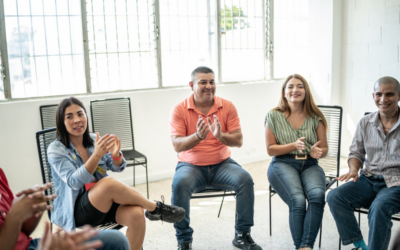October 22, 2024
Type 2 diabetes is a serious condition that requires continuous management. Without management, patients are at risk of high blood sugar levels that can seriously damage parts of their body, including their feet and eyes. Giving people with diabetes the confidence and education they need to manage their condition can prevent or delay complications.
Language barriers can be an issue that prevents diverse populations from attending and receiving structured diabetes education. At EMPOWER, we can deliver our award-winning, four-hour programme in multiple languages, including Gujarati, Hindi, Urdu and Polish. Participants can also bring a career or family member to support them during the session.
Adapting our programme to suit the needs of participants brings multiple benefits, including:
- Information about food and diet is relevant and relatable.
- Information is easy to understand when delivered in their preferred language.
- Patients and educators have better communication.
Our admin team also speak the additional languages we can deliver, helping patients through the booking process from start to finish.
In focus: diabetes education in Lancashire
When patients are referred for structured diabetes education by their GP (or if they self-refer), they can request what language they would like it delivered in.
In Lancashire, we have worked closely with the ICB since 2017.
Results from the 2021 census [1]showed a 2% increase in people of ‘Asian, Asian British or Asian Welsh’ ethnicity compared to 2011. Urdu is also the third most spoken language in Lancashire.
In 2020/21, we started delivering our programme in Lancashire in Urdu, both face-to-face and via Microsoft Teams, to meet the needs of the local population.
So far, over 100 people have benefitted from getting the support they need to live well with type 2 diabetes in a way that’s easy for them to understand.
Sabeera, one of our EMPOWER educators shares what makes these sessions so exciting to deliver:
“I get great satisfaction from delivering our programme in alternative languages.
I love seeing how attendees start interacting and engaging with the course when they realise that having diabetes doesn’t mean they need to give up their favourite foods. Helping them learn about making small adjustments and changes to their lifestyle to help them stay well and avoid complications is a joy.
We often have a lot of conversations about cooking specific meals and how to make them healthier. It’s a great learning curve for me to understand common favourite meals and make valuable suggestions that don’t compromise on taste!”
Irfan Patel, NHS Lancashire and South Cumbria Integrated Care Board said:
‘We are deeply committed to ensuring that everyone in our community has access to high-quality structured diabetes education.
Working with EMPOWER, we have helped to educate thousands of people, and I’m proud to see the difference it is making to people’s lives. By offering these vital sessions in Urdu, we are breaking down barriers and creating more inclusive opportunities for those with type 2 diabetes to access the support they need.”
Suraj Mohammed, Health Inequalities Project Manager at Burnley East Primary Care Network attended the training to observe:
“I wanted to observe the training to learn how cultural & faith-related issues were embedded in the training regarding diet/fasting, favourite foods of the South Asian community and how this was near impossible to get people to abstain from.
This was tackled excellently by providing alternatives and reassuring delegates you were not asking them to stop eating these foods, but just to reduce them.”
Are you interested in finding out more?
If you want to learn more about how we can support your patients with structured diabetes education, please get in touch.
______________________
References
[1] https://www.lancashire.gov.uk/lancashire-insight/population-and-households/population-and-households-census-2021-articles/census-2021
CLI5108SEP24


